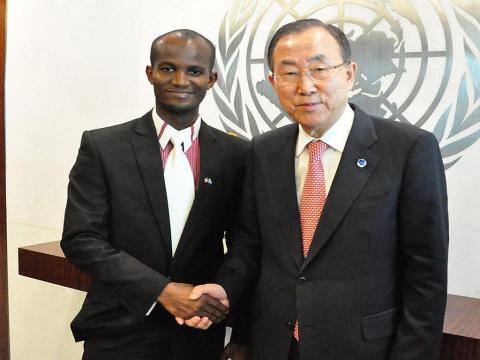By Asmieu Bah
Some of the interesting or fascinating privileges of being a journalist hardly enjoyed by any other profession are the fortune and honour to hobnob with the movers and shakers of events in society, as well as meet the less-privileged and down-trodden. The latter’s story get put to the former who are often challenged for their action or inaction. For this, one of the high points of this year’s Reham Alfarra Memorial Journalists Fellowship Programme was meeting the first gentleman of the United Nations, Ban Ki-Moon. The South Korean happens to be the seventh Secretary-General of the world body since it was born in 1945 at the end of the Second World War. For those of the participants meeting Mr Ban for the first time, it was eagerness enveloped in restlessness for what would clearly be a once-in-a-lifetime opportunity for most to shake the hands of the world’s topmost civil servant. For one thing, I was not one of those. Even though I was also eager it was not my first time of meeting him. I first met the UN boss in 2010 back home in Sierra Leone at Hotel Cabenda Hotel during a visit during which he inaugurated the Sierra Leone Broadcasting Corporation. I was the youngest journalist to be in the midst of the then President of the Sierra Leone Association of Journalists, Umaru Fofana and the man who would later succeed him the current president Kelvin Lewis. A renowned Sierra Leonean researcher and writer, Lans Gberie and few other doyens in the Sierra Leone’s media landscape were also present in that meeting. Back to here in New York, we left the ninth floor of the UN Headquarters, our usual place of converge. The Secretary General’s office is at the 38 floor, where we arrived and were greeted by UN security personnel who already knew about our meeting with the SG. They ushered us in to the waiting room, where we sat for few minutes until a heavily built man showed up to lead us in to the SG’s conference room, just opposite his office which is a few steps away. The office is well decorated with well polished wooden table apparently made of mahogany, complete with cosy leather chairs. The board work in the room was spellbound and would get the attention of any first time visitor to that office. On the other side of the room hangs the photo of the Secretary General. Through the window one can see the East River of New York and on the other side stands the office of the US Permanent Representative to the UN. No sooner had we entered the room than we saw a gentle man in a dark suit, a white shirt and a red tie, whose face needed no introduction. It was the Secretary General himself. “Good afternoon ladies and gentlemen” he politely greeted us and later welcomed us to his office. “Let’s first have the group photo” he requested, before he shook hands with each participant. “Where are you from” he asked everyone after a handshake. We stood just as we had rehearsed on the previous day. Mr Ban’s camera man took many shots from different angles. You can see the radiance of excitement and smile on our faces as the cameraman kept on releasing a barrage of flash. After the snapshots, each of us took our seat and the SG was the last man to take his, something I interpret to mean a good host. Then he made an extemporaneous speech. His first point was the importance he attaches to young people, the reason according to him, which drove him to appoint a 29-year-old Jordanian, Ahmad Alhendawi as the first UN Envoy on Youth Affairs. Mr Ban spoke of his determination to create a better future for youth around the world whom he called on to take charge of the world and exhibit their God-given talent. The second issue he touched on was the important role journalists play in world peace. He said that as journalists we must not be seen to be taking sides to the extent of not being tolerant to others or their opinions or beliefs. He chose the most heated debate in the UN corridors at present – the Syria crisis. He said that the UN findings on the use of chemical weapons would be out very soon. How soon, he said nobody knew. But he was firm in saying that the situation in the war torn country was unacceptable. Mr Ban briefly touched on the Israel-Palestine issue and urged that both countries should work together to bring peace to their peoples, before touching on the UN Millennium Development Goals as his last item. He reaffirmed the UN’s role in reducing poverty in the world and lamented that 57 million children are out of school which he described as “worrisome and frightening”. Such is how busy his schedule is that the meeting had to last for less half an hour. But in that time he hammered home his points and gave opportunity to us to ask questions as if to symbolise his management skills. The soft-spoken Secretary General spoke passionately and determinedly to address some of the issues he outlined especially during this his second and final term. After the meeting we left the conference room feeling very fulfilled and having completed one of the milestone events in the fellowship. From his answer about the Syrian crisis I was left with the impression that Syria could be likened to Rwanda and Srebrenica under Kofi Annan. In those cases the UN was blamed for not taking action to prevent the onslaught and genocide. On the whole it was a good experience and an honour for me to have met the UN Secretary General. It is, doubtless, an experience that will always linger on my mind as I move on with life and my career in this noble profession – the world’s best – journalism. (C) Politico 19/08/13








